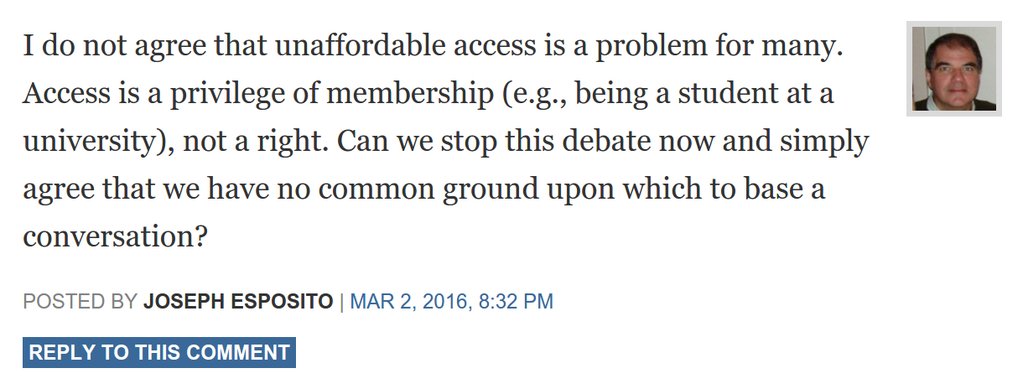Three years ago, representatives of libraries, publishers and scholars all agreed that academic publishers don’t really add any value to scholarly articles. Last week, I interpreted Sci-Hub potentially being a consequence of scholars having become tired after 20 years of trying to wrestle their literature from the publishers’ stranglehold by small baby-steps and through negotiations and campaigning alone. Maybe the developments could be an indication that the frustration may be growing among scholars, readying them to break ranks with publishers altogether?
After 20 years of negotiations about how to realize universal open access to all scholarly literature with publishers, maybe it’s time to stop negotiations and develop an open access infrastructure without publishers? After all, it would save human lives as well as billions of dollars every year.
I had not anticipated support for the notion of stopping negotiations with publishers from the same person who also confirmed that publishers add little value to scholarly articles three years ago, Joseph Esposito. In his own words, Mr. Esposito is a “publishing consultant”, working for publishers involved in research publishing. He advises these companies on strategies concerning, among other issues, open access. Until this writing, he has penned 253 articles for the blog of the Society for Scholarly Publishing, an organization representing academic publishers. It is probably safe to assume that his continued presence at this blog after such a number of posts can be taken as an indicator that his opinions expressed there are generally not in obvious disagreement with those of the academic publishers as members of the society. His continued success as consultant to some of said society members can also be taken as an indication that his advice is being followed by his clients. In brief, the word of Mr. Esposito has carried and continues to carry some significant weight with publishers.
For the second time in three years, Mr. Esposito and I agree on something: we should stop negotiating access with legacy publishers:

Screenshot via Mike Taylor
Quite clearly (this is the full account of the entire comment, so it cannot be taken out of context), for Mr. Esposito, access to the scholarly literature is a privilege worth paying for. Moreover, he sees no need to negotiate this position any further. Inasmuch as this opinion instructs his advice to publishers, scholars should not be surprised, for instance, that publishers actively block contentmining and will not negotiate about this blockade of science. This opinion also reinforces my assessment that talking with legacy publishers, at this point, has become a complete waste of time. This is how far they are willing to go and no further concessions can be expected.













Comments are closed.